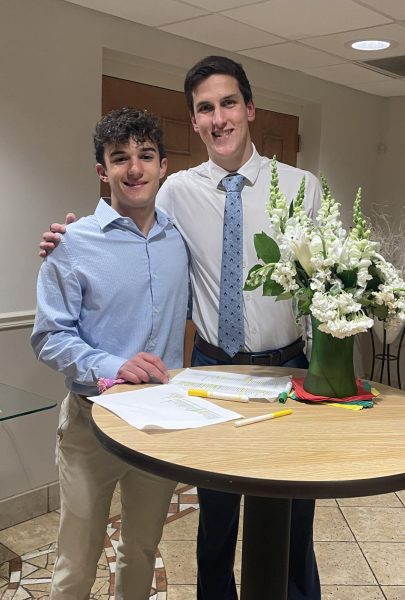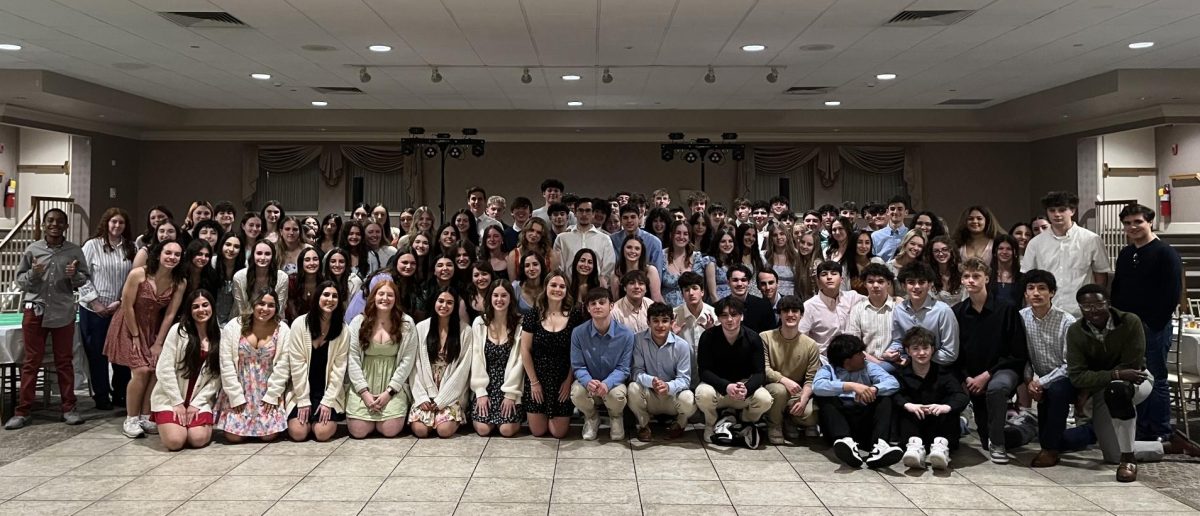Have you ever wondered why Portuguese language classes are offered at LHS but not at other schools in the area? Or, why do we eat those delicious pork cutlets during lunch on that random day in March? Well, the answer to that question lies deep in the roots of Ludlow’s vibrant Portuguese community. The cultural influence goes beyond the walls of our casas, spreads wider than the lights that illuminate Lusitano Stadium, and winds past the roads Windsor and East like a story waiting to be told.
As someone who grew up in the Portuguese community, the history and traditions have always been obvious to me. Moreover, my Portuguese Teacher, Senhora Fernandes, has made sure to educate us about our heritage and the history of Ludlow. That’s why I was surprised to learn that many of my peers did not know just how deeply embedded the culture is in our town. But maybe that’s just the clearest sign of all: Portuguese culture is so prevalent in Ludlow that it has become second nature. The deep-rooted presence of Portuguese culture in Ludlow not only shapes the town’s traditions and institutions but also plays a vital role in the identity of Luso-American teens at Ludlow High School.
A Brief History
There were three major waves of immigration by the Portuguese into America: after the Republican Revolution in Portugal 1910-1930, Post- World War ll as a result of immigration quotas being raised and the influx of employment opportunities at the mills, and in the early 1960s partially due to the Immigration and Nationalities Act of 1965. Most of them came to Ludlow by the attraction of employment opportunities in the Mills. Despite occurring across various different eras, all Portuguese immigrants coming to America share the same motive: the search for a better life.
Someone’s Avôs and Avós made the brave choice to leave all they had ever known behind to start a new life. Not knowing what that would entail, not knowing the language, not knowing the American way of life. In navigating the unknowns and hardships of the United States, our ancestors stayed true to their Portuguese way of life, hardworking Portuguese ideals, and the language.
The Life of a Ludlow Portuguese American
Growing up in town as second-generation Portuguese on my Mom’s side, and first generation with my Dad, there was a plethora of traditions that my upbringing made me a part of. From as early as I can remember, my Avó was piling Bacalhau onto my plate at Sunday family lunch after church or watching my Avô yell in Portuguese at the TV while Benfica played on RTP.
My friend Ryan Mateus, a fellow student at LHS, shares some of the same experiences. He remembers going to festas with his family, dancing to Portuguese music, and being raised fully immersed in the culture.
“My mom always played Portuguese music in the house and taught me how to dance when I was young,” Ryan recalls. “I love Jorge Ferreira—I listen to him every day.”
Ryan is also a volunteer at Our Lady of Fatima Church in town, where he regularly serves as a Lector during mass, and goes to the annual Festa at the church during Labor Day weekend. “My family goes to the Festa every year and we dance all night,” he said.

Ryan’s story reflects what so many Luso-American kids in Ludlow experience. Whether it’s the music, the food, or the family gatherings, these traditions passed on by our families connect us to the Portuguese way of life.
This experience isn’t unique to just Ryan, however, Filipe Fernandes, who is another one of my classmates, also mentioned his love for his family’s Portuguese traditions. “Every Christmas,” Filipe said, “I would always help my Mom to make pão de ló and filhós, helping make these desserts made me feel closer to my culture.”
These traditions aren’t just about eating, dancing, or cooking, they’re about connecting to the heritage and carrying on the beloved rituals of our families. We carry on these traditions because they have been passed down through generations, and practicing them is a way of honoring our heritage and ancestry.
At School
That culture doesn’t just stay on the doorstep as we leave for school every morning; it follows us into the halls of LHS and is shown proudly throughout our school day.
Portuguese language class serves as a prime example of this. This program was implemented in the 70s by a strong Portuguese woman named Senhora Fagundes. Many students walk into the aula, having grown up around the language or maybe even being fluent in it. Most Portuguese kids comprehend the mix of Portuguese and English words that their Avós invented by fusing the root English word with a Portuguese-sounding ending. For example, closeta, knifa, and my personal favorite, the thinga, all belong to that category of invented Portuguese words that were combined with English vocabulary. Not only that, but in most cases, students have been taught Portuguese alongside English in order to communicate with their Avós.
But, it is the job of our two current Portuguese teachers, Senhoras, at LHS to help correct and teach the proper diction and pronunciation of the beautiful Portuguese language. These teachers go above and beyond to ensure that students aren’t just learning the language, but they also implement it within situational conversations, take their skills to employment opportunities, and achieve fluency in the language as a part of the Seal of Biliteracy. These teachers also help teach heritage students the history of their family’s culture beyond what they had already known.
Gabby Fernandes, a Luso-American student in the Portuguese language class, says, “Senhora Fernandes has taught me so much about the history of the Portuguese community in Ludlow.”
This Portuguese class allows Luso-American students to come together inside of school and share their common experiences and traditions that their ancestors have brought from Portugal.
 Now, the major way that Portuguese students come together and embrace their culture inside the school is through the Portuguese Club. This club consists of around a hundred students, Portuguese and non-Portuguese, who put on events throughout the school year about Portuguese culture. For example, around November 11th every year, we celebrate the holiday of São Martinho. Members of the club bring in foods that their families make to help celebrate this holiday, such as roasted chestnuts, chouriça, and other traditional dishes passed down through generations. These celebrations give students a chance to share a piece of their heritage with our similar students, allowing them to create a community within the high school.
Now, the major way that Portuguese students come together and embrace their culture inside the school is through the Portuguese Club. This club consists of around a hundred students, Portuguese and non-Portuguese, who put on events throughout the school year about Portuguese culture. For example, around November 11th every year, we celebrate the holiday of São Martinho. Members of the club bring in foods that their families make to help celebrate this holiday, such as roasted chestnuts, chouriça, and other traditional dishes passed down through generations. These celebrations give students a chance to share a piece of their heritage with our similar students, allowing them to create a community within the high school.
One of the biggest highlights of the year is the Portuguese Club Dinner Dance, an event that brings our culture to life in a way everyone can experience. Students, Portuguese or not, come to enjoy a night of food, music, dancing, and community. From traditional Portuguese dancing to classic Portuguese dishes like Carne de porco à alentejana and pasteis de nata, the event is a reminder that our culture is meant to be shared—and celebrated. It’s a night where the sounds of Jorge Ferreira fill the room, and where being Portuguese feels more like being part of something bigger than yourself.
This year, I was overjoyed when my friend Joe Keroack asked to attend the dance. I could not wait for him to experience my rich culture that I was so proud of. After the event, I asked Joe what he thought—and he couldn’t stop talking about how much fun he had. “I wish I were Portuguese,” he joked, smiling.

But behind the joke was something real: a genuine appreciation for the warmth, tradition, and community that the night represented. For non-Portuguese students like Joe, getting a glimpse into our culture reveals something special. And for us, as Luso-American teens, it’s a reminder that what we carry isn’t just tradition—it’s unity. It’s pride. It’s something others admire, and something we’re lucky to live every day.
What It All Means
Being a Luso-American teen isn’t just about where our families came from, it’s about the backpack of traditions and customs that we hang on our shoulders every day at school. We were raised to be this way. It’s because we observed our family’s traditions at Sunday lunch. It’s because we danced and made pão de ló with our Moms. It’s because our Avós invented those crazy Portuguese and English words. All of these events made us who we are as individuals today. The embrace of our culture and traditions isn’t left at home in our casas. We embrace the beauties and traditions of our culture, which unite the Luso-American students with pride. So if you’ve ever wondered why Portuguese classes are offered here and not everywhere else, or why we’re serving pork cutlets on that random day in March, now you know. It’s not just a class or a lunch menu item. It’s a celebration of identity. It’s a living story—one that stretches past Windsor and East, glows brighter than the lights at Lusitano Stadium, and lives on in every Luso-American teen walking the halls of LHS.



Ryan • Jun 2, 2025 at 1:37 pm
Great work!
Ethan • Jun 2, 2025 at 1:37 pm
This article nails what it means to grow up Portuguese in Ludlow. It’s clear, honest, and shows how the culture shapes everyday life here. Amazing job.
Nick P • May 30, 2025 at 4:12 pm
Beautifully written, what a joy to be graced with the literary presence by someone so linguistically talented like Sam
Andrew • May 30, 2025 at 1:16 pm
Wonderful writing!!!!
Larissa • May 30, 2025 at 1:16 pm
Spectacular Sam, absolutely superb.